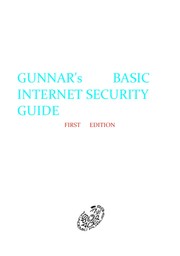Check nearby libraries
Buy this book

HTML version readable on consulting firm's website.
Check nearby libraries
Buy this book

Subjects
surveillance, mass surveillance, counter-espionage, espionage, cloud computing, european data protection, russian data protection, latin american trade secrets, trade secrets, data guides, internet securityPeople
Gunnar K. A. NjålssonPlaces
Russia, European Union, Eurasian Union, Latin America, MERCOSURShowing 2 featured editions. View all 2 editions?
| Edition | Availability |
|---|---|
|
1
Gunnar's Basic Internet Security Guide: Protecting Europe's Trade and State Secrets
2015, SPACEPOL Academic Publishers
E-book
in English
- PDF Edition
0981247598 9780981247595
|
zzzz
Libraries near you:
WorldCat
|
|
2
Gunnar's Basic Internet Security Guide: Protecting Europe's Trade and State Secrets
2015, SPACEPOL Academic Publishers
ebook
in English
1987881001 9781987881004
|
aaaa
Libraries near you:
WorldCat
|
Book Details
Table of Contents
Edition Notes
Classifications
The Physical Object
ID Numbers
Work Description
The purpose of this guide is to provide the global corporate internet community with a plain-language warning and source of suggestions to help improve the current state of internet security and decrease the ability of governments and competing businesses to engage in industrial espionage. It is not a complete guide. It is not to be viewed as concrete advice for policy in the case of individual businesses. It is not legal advice.
The guide is aimed primarily at a European, Russian and Latin American audience and expresses opinions from that vantage point. Concretely, the point of departure is that European, Russian and Latin American businesses have every right to protect themselves from privacy violations and spying in accordance with the legislation of their sovereign nations.
Excerpts
directly under the control of your organization. Employees, officers and service
suppliers should have compartmentalized and audited access only to data assets
relevant to their immediate duties. Their backgrounds, integrity and loyalties should
be investigated on a level corresponding to the value of the assets they have access
to and the amount of damage they could do by abusing that access. People with poor
internet and data skills are as dangerous as people who can abuse access to data
assets. An organization must have very clear policies on what its computer
infrastructure may be used for. Personnel must be trained to understand basic facts
about e-mail, computer viruses, social networking risks and the legal situs location of
data and transactions.
Operating systems, software and equipment may directly expose organizations to
espionage or leakage of data assets when they allow “back door” access by the
manufacturer or external parties or perform network transactions which are not
clearly visible to or authorized by the user. This includes routers and other peripheral
equipment in the data environment. The most common operating systems and
software are more likely to be targeted by government and non-government parties
engaged in espionage and surveillance. Many security experts currently believe that
software with code that can be freely examined poses less of a risk for these
dangers than proprietary software where examination of the code is restricted or not
possible.
Links outside Open Library
Community Reviews (0)
Feedback?| March 3, 2016 | Edited by HA-FIESSPA | Added new cover |
| March 3, 2016 | Edited by HA-FIESSPA | Added HTML edition |
| March 3, 2016 | Edited by HA-FIESSPA | Added library item - basic bibliographical data |
| March 3, 2016 | Created by HA-FIESSPA | Added new book. |










